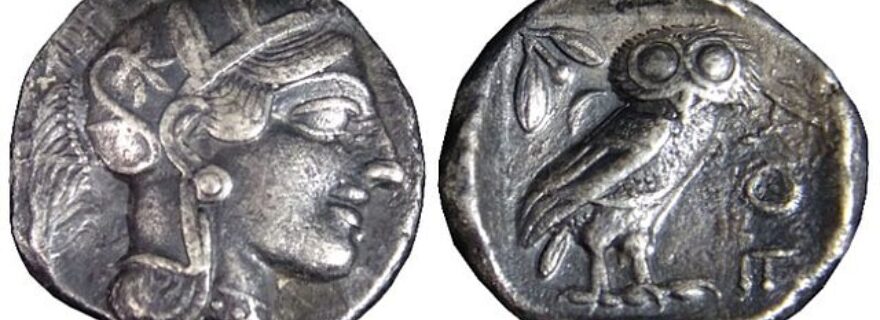Stoic Sage vs. Homo Economicus: the Battle for the Ages or…not?
Do Stoic ideas present an alternative to modern economic thinking? In this blog post, Aiste Celkyte explores the differences and surprising similarities between the Stoic sage and the homo economicus.
Recent years have seen an explosion of interest in Stoicism. The key selling point of Stoicism is that it provides practical guidelines to a happier and even healthier life (Robertson 2010; Becker 1998). Although originally presented as a tool for individual people, it is perhaps unsurprising that there is also some interest in exploring broader applications of Stoicism to policies. Stoic ethics, embodied by the concept of the Stoic sage, is offered as a solution to the ailments of the modern age, including such large-scale problems as climate change. The Stoics claim that virtue is the only way to a happy life. Therefore, the argument goes, living virtuously is the most productive approach to take in face of the problems created by the modern idea of human nature as self-serving (see, for example, Whiting, Konstantakos, Carrasco and Carmona (2018)).
The self-serving nature is captured by the notion of homo economicus, often traced to the point made by Adam Smith in The Theory of Moral Sentiments stating that ‘It is not from the benevolence of the butcher, the brewer, or the baker that we expect our dinner, but from their regard to their own interest’ (Book 1, chapter 2).


Over decades and centuries, Smith’s point developed into what is known as the rational choice theory, which models our interactions in terms of seeking the most efficient means to a further end (as opposed to behaviour guided by social norms and not concerned with outcomes (Elster 1989: 22)). Thus the Stoic model, grounded in pursuit of values and embodied by the sage, can be reasonably seen as an alternative to the homo economicus, the notorious embodiment of the perfectly rational, self-interest-driven economic agent.
In many ways, this interest in Stoicism opens an exciting discussion, encouraging looking into the ancient texts for interesting and useful ideas. At the same time, a closer look at the Stoic treatment of the sage might raise some concerns about presenting it as a solution to the ills caused by homo economicus.
Although it is generally true that the behavior of the Stoic sage is driven by virtues, such a description glosses over some important points. To simply say that one ought to live in accordance with virtue is hardly informative advice, because such a guideline can be construed in different ways. Furthermore, the Stoics themselves specified the meaning of this sagehood in technical epistemological terms. A person becomes a sage when she assents only to cognitive impressions (Sextus Empiricus Against the Professors 7.151-7); to put it simply (although a bit anachronistically), when she makes judgments only on the basis of clear evidence while being in a good state of mind and suspends her judgment in regard to everything else. In other words, the sage is a perfectly rational agent. In this respect, she does not differ from homo economicus. Further problems emerge when we look at the claims the Stoics make about what could be called economic behavior of the sage. Consider the following two examples.
1. Earning a living. When describing the best ways to earn a living, the Stoics give the options of kingship and political life, noting that the sage ‘will acquire wealth both from political society and from friends in high places’ (Stobaeus 2.109.10-20). This claim originates from a polemical exchange between various philosophers. One of the Stoic targets here are the Epicureans, their contemporaries who argued that pleasure, rather than virtue, is the foundation of ethics. The Epicureans maintained that the sage would not take part in political life (Diogenes Laertius 10.119), presumably motivated by a generally critical attitude towards customary cultural institutions and practices (Schofield (1991, appendix D)). The Stoics took the opposite side in this debate. The sage would follow standard practices and seek financial gain. This point is corroborated by one further argument.


2. Seeking financial gain is not unvirtuous. In book three of his On Duties, Cicero describes the debate between two Stoics: Diogenes of Babylon and Antipater. The point under discussion is the following situation. A wheat merchant comes to the island of Rhodes, bearing his goods, having seen that he is the first of many other merchants heading this way. As it happens, there is a severe shortage of wheat on the island. Thus he is able to sell his goods at a high price at the moment, while being aware that the shortage will be over as soon as other merchants arrive. The question under discussion is whether selling wheat at a higher price is consistent with being virtuous. The two Stoics adopt opposite positions: Diogenes argues that the merchant ought to sell the wheat at a higher price, while Antipater maintains that this would not be virtuous (On Duties 3.50-3). The motivation behind both positions is not transparent and requires further study. One of the case studies I will carry out as a part of my postdoctoral project within the larger Economic Views on Human Being in Ancient Greece project will be dedicated to precisely this task.
Even without an in-depth analysis of this text, it is quite clear that Diogenes is arguing that a virtuous man would not be doing anything wrong when acting in a way that increases his own profits, even at the expense of exploiting the unfortunate circumstances of others. This evidence leads to a peculiar conclusion. It turns out that the Stoic sage might have more in common with homo economicus than we might like, especially if we wish to turn to Stoicism for the solution of the problems caused by homo economicus style of thinking.
Although it might be disappointing not to find some profound piece of wisdom that might help us deal with complex problems facing us today, such a conclusion about the sage is actually really interesting. Given how radical the core tenet of Stoic ethics is, that is, virtue is the only good, it is unexpected to find them advocating for gain-seeking behavior, and this counterintuitive line of thinking deserves to be explored in its own right. After all, the value of the ancient texts does not necessarily lie in the direct use they can provide for the current world; instead, they are windows to a completely different world and different ways of thinking, which can help us improve how we think about certain problems rather than provide us with clues about what to think.
Bibliography
Becker, L.C. 1998. A New Stoicism. Princeton: Princeton University Press.
Elster, J. 1989. Nuts and Bolts for the Social Sciences. Cambridge: CUP.
Robertson, D. 2010. The Philosophy of Cognitive-Behavioural Therapy (CBT): Stoic Philosophy as Rational and Cognitive Psychotherapy. London: Routledge.
Schofield, M. 1991. The Stoic Idea of the City. London/New York/Routledge.
Smith, Adam, ed. K. Haakonssen. 2002. The Theory of Moral Sentiments. Cambridge: CUP.
Whiting,
K., L. Konstantakos, A. Carrasco, and Luis G. Carmona. 2018.
"Sustainable Development, Wellbeing and Material Consumption: A
Stoic Perspective." Sustainability
10, no. 2: 474.
© Aiste Čelkyte and Leiden Arts in Society Blog, 2021. Unauthorised use and/or duplication of this material without express and written permission from this site’s author and/or owner is strictly prohibited. Excerpts and links may be used, provided that full and clear credit is given to Aiste Čelkyte and Leiden Arts in Society Blog with appropriate and specific direction to the original content.



0 Comments